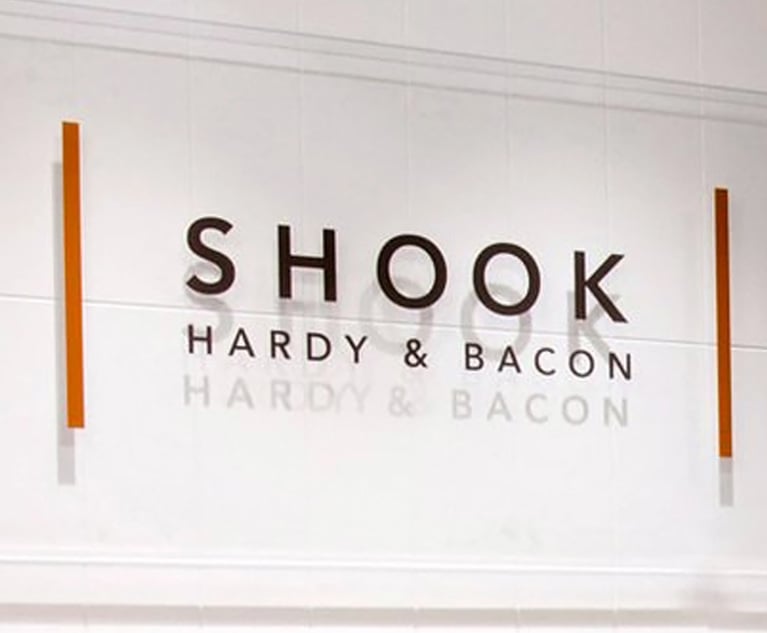Australian Legal Tech Start Up Aims to be Ubiquitous Destination for Small Business
The Sydney-based start-up, which generates legal documents for small businesses and connects them with lawyers, sees potential to expand its business beyond its current 1% Australian market share.
November 12, 2019 at 06:28 PM
6 minute read
The original version of this story was published on Law.com
Dominic Woolrych, the CEO of Lawpath, is hoping to make the Australian legal platform the ubiquitous destination for small businesses seeking legal help as legal tech moves into what he sees as its second phase.
Just as small businesses are used to doing their accounting online, Woolrych expects they will also grow more comfortable with seeking legal services via the internet.
"Where we want to be in five years' time is just like what Xero or Intuit has done to accounting, where if you're a small business they've become synonymous with doing your accounting," Woolrych said. "We want to be that for law."
The Sydney-based start-up generates legal documents for small businesses and connects them with lawyers, and Woolrych said there is huge potential to expand the business beyond its current 1% Australian market share.
The business will use some of the proceeds from its recent capital raising to market the site beyond its online business customers base to "mum and dad" and bricks and mortar-type businesses, with the aim of hitting a 10% market share by 2022.
"People are now used to doing their accounting and banking and their insurance online. There are platforms for all of those things. Lawpath will be the platform for your legals," he said.
The platform has been built so it can be internationalised and Lawpath is planning to expand in the next couple of years into Asia, where Woolrych said there is currently no significant platform offering the service.
There are two distinct types of legal technology, said Woolrych. The first creates efficiencies for lawyers, with document researching, document drafting, and discovery. This is mostly where the legal tech boom has been concentrated as firms and lawyers have adopted the technology.
The second phase of legal tech growth creates efficiencies directly for clients, and this is only just beginning. "I think it's an extremely exciting time for legal," Woolrych said. "Whereas FinTech went through its boom two or three years ago, I really think legal tech is now at the beginning of its boom."
Woolrych has witnessed the legal tech boom in Australia firsthand. He is a director of the Australian Legal Tech Association, which he and others founded two years ago with just 10 members. Now it has over 160.
Earlier this month Lawpath closed an A$4.4 million ($3 million) funding round from investors that included U.S legal tech company LegalZoom, which was making its second investment.
In fact, the rise of LegalZoom and Rocket Lawyer in the U.S. provided the inspiration for the founding of Lawpath in 2014. One of Lawpath's four founders is Nick Abrahams, global head of technology & innovation at Norton Rose Fulbright.
Having seen the rise of LegalZoom and Rocket Lawyers in the U.S., the founders decided to start a similar service in Australia, where none existed. Lawpath initially started as a connection service between lawyers and clients but the founders quickly realised that many small businesses couldn't afford lawyers and needed a way of completing legal tasks themselves, then finding a lawyer if they couldn't solve the problem.
The company helps businesses with the legal basics they need to get started, such as creating and registering a company and producing share certificates and constitutions. It is linked with regulators via APIs, enabling users to register a company and register with the Australian Tax Office in a few seconds.
From there, it helps with such tasks as the creation of employment agreements, generating them automatically from details entered by the client, who can customise it with confidentiality agreements or non-compete clauses. Users can also use the company to create website terms and conditions, trademarks and commercial leases.
If clients want a more specialised agreement they can use the Lawpath marketplace, where they can post the job requirements, receive bids from lawyers and review ratings before picking a lawyer to carry out the work. Many of the platform's lawyers are stay-at-home mothers or retired practitioners seeking more flexibility, says Woolrych, formerly a lawyer with Australian firm MinterEllison.
Lawpath takes a 20% commission.
"What we're trying to do is bridge this gap between when you first start a business or when you are a small business and you can't afford to go to a lawyer every time you need a new contract," he said.
Earlier this month, Lawpath launched its Legal Advice Plan, where users pay a subscription of A$49.00 ($33.50) per month for access to all the online legal documents and unlimited calls with a lawyer who can provide advice, but won't do document review or drafting.
Woolrych conceded it might sound too good to be true, but Lawpath, he said, is "a volume play," which helps keep the costs down.
As for concerns that customers would take advantage of unlimited calls with a lawyer, he drew an analogy: "If the dentist said to you 'I'm going to give you free unlimited visits," you're not going to go every day. You're going to go when you need a check-up and when there's a problem."
The business, which is yet to make a profit, is targeting companies with up to 25 employees but eventually plans more sophisticated offerings for larger companies.
Ultimately, it wants to make the platform more efficient for clients and less reactive.
"Legal services have always been really reactive, as in when there's a problem, you go and talk to a lawyer," said Woolrych. "But what if we could kind of flip that around and make legal proactive so that it catches problems before they even occur? And the reason that legal is not proactive at the moment is just because it's so expensive."
Woolrych believes software can be used to help anticipate legal issues. One useful feature can be rolled out to hundreds of thousands of clients, he said.
Lawpath is already offering what it calls a legal health check for clients — a program that checks to ensure that companies have shareholder agreements in place and have protected their brands with trademarks.
This content has been archived. It is available through our partners, LexisNexis® and Bloomberg Law.
To view this content, please continue to their sites.
Not a Lexis Subscriber?
Subscribe Now
Not a Bloomberg Law Subscriber?
Subscribe Now
NOT FOR REPRINT
© 2025 ALM Global, LLC, All Rights Reserved. Request academic re-use from www.copyright.com. All other uses, submit a request to [email protected]. For more information visit Asset & Logo Licensing.
You Might Like
View All

Meet the Long Island Judge Tapped to Be US Attorney for Eastern District of New York
3 minute read
Appeals Court Rejects Trump Attempt to Delay Friday Sentencing
Trending Stories
- 1Courts, Lawyers Press On With Business as SoCal Wildfires Rage
- 2Florida, a Political Epicenter, Is the Site of Brownstein Hyatt's 13th Office
- 3Law Firms Close Southern California Offices Amid Devastating Wildfires
- 4Lawsuit alleges racial and gender discrimination led to an Air Force contractor's death at California airfield
- 5Holland & Knight Picks Up 8 Private Wealth Lawyers in Los Angeles
Who Got The Work
Michael G. Bongiorno, Andrew Scott Dulberg and Elizabeth E. Driscoll from Wilmer Cutler Pickering Hale and Dorr have stepped in to represent Symbotic Inc., an A.I.-enabled technology platform that focuses on increasing supply chain efficiency, and other defendants in a pending shareholder derivative lawsuit. The case, filed Oct. 2 in Massachusetts District Court by the Brown Law Firm on behalf of Stephen Austen, accuses certain officers and directors of misleading investors in regard to Symbotic's potential for margin growth by failing to disclose that the company was not equipped to timely deploy its systems or manage expenses through project delays. The case, assigned to U.S. District Judge Nathaniel M. Gorton, is 1:24-cv-12522, Austen v. Cohen et al.
Who Got The Work
Edmund Polubinski and Marie Killmond of Davis Polk & Wardwell have entered appearances for data platform software development company MongoDB and other defendants in a pending shareholder derivative lawsuit. The action, filed Oct. 7 in New York Southern District Court by the Brown Law Firm, accuses the company's directors and/or officers of falsely expressing confidence in the company’s restructuring of its sales incentive plan and downplaying the severity of decreases in its upfront commitments. The case is 1:24-cv-07594, Roy v. Ittycheria et al.
Who Got The Work
Amy O. Bruchs and Kurt F. Ellison of Michael Best & Friedrich have entered appearances for Epic Systems Corp. in a pending employment discrimination lawsuit. The suit was filed Sept. 7 in Wisconsin Western District Court by Levine Eisberner LLC and Siri & Glimstad on behalf of a project manager who claims that he was wrongfully terminated after applying for a religious exemption to the defendant's COVID-19 vaccine mandate. The case, assigned to U.S. Magistrate Judge Anita Marie Boor, is 3:24-cv-00630, Secker, Nathan v. Epic Systems Corporation.
Who Got The Work
David X. Sullivan, Thomas J. Finn and Gregory A. Hall from McCarter & English have entered appearances for Sunrun Installation Services in a pending civil rights lawsuit. The complaint was filed Sept. 4 in Connecticut District Court by attorney Robert M. Berke on behalf of former employee George Edward Steins, who was arrested and charged with employing an unregistered home improvement salesperson. The complaint alleges that had Sunrun informed the Connecticut Department of Consumer Protection that the plaintiff's employment had ended in 2017 and that he no longer held Sunrun's home improvement contractor license, he would not have been hit with charges, which were dismissed in May 2024. The case, assigned to U.S. District Judge Jeffrey A. Meyer, is 3:24-cv-01423, Steins v. Sunrun, Inc. et al.
Who Got The Work
Greenberg Traurig shareholder Joshua L. Raskin has entered an appearance for boohoo.com UK Ltd. in a pending patent infringement lawsuit. The suit, filed Sept. 3 in Texas Eastern District Court by Rozier Hardt McDonough on behalf of Alto Dynamics, asserts five patents related to an online shopping platform. The case, assigned to U.S. District Judge Rodney Gilstrap, is 2:24-cv-00719, Alto Dynamics, LLC v. boohoo.com UK Limited.
Featured Firms
Law Offices of Gary Martin Hays & Associates, P.C.
(470) 294-1674
Law Offices of Mark E. Salomone
(857) 444-6468
Smith & Hassler
(713) 739-1250










